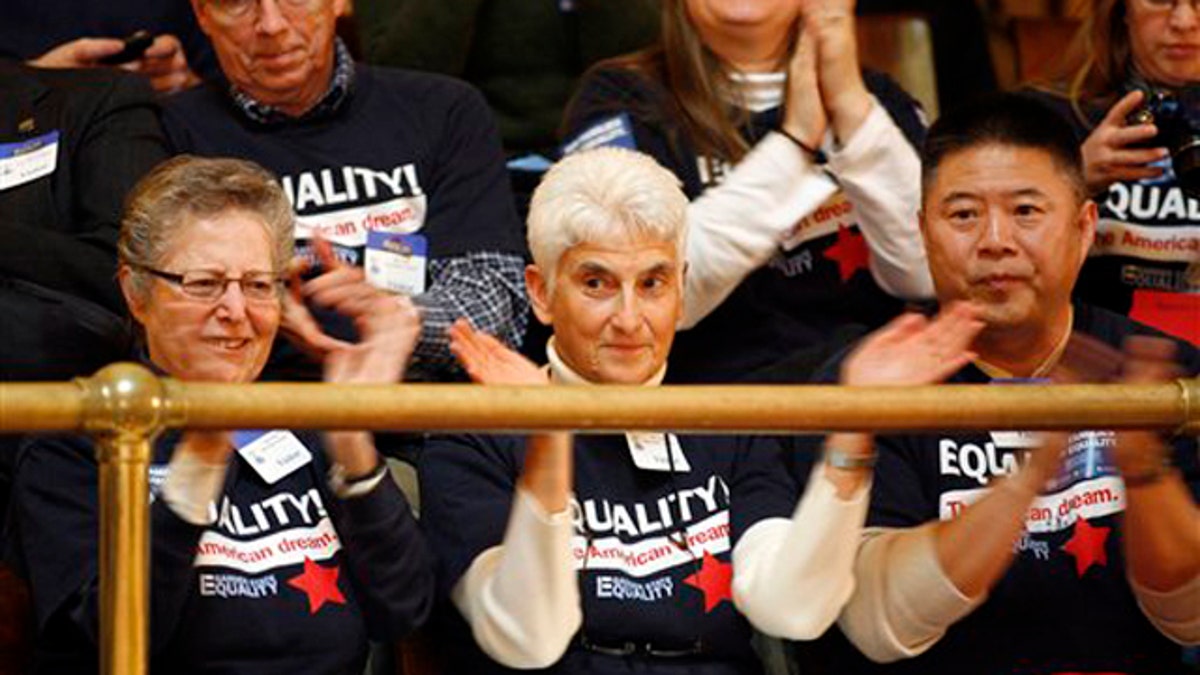
Feb. 13, 2012: Spectators in the balcony applaud the passage of the same-sex marriage bill in the New Jersey State Senate in Trenton. Gov. Chris Christie later vetoed the bill. (AP)
The same-sex marriage debate has exploded back onto the national stage in a matter of days, exposing sharp divisions within and between the parties while offering a muddy portrait of where Americans stand on the issue.
Same-sex marriage bills advanced toward the governor's desk in three states since last week, with different results.
Washington Gov. Chris Gregoire, a Democrat, signed her state's bill into law Monday. New Jersey Gov. Chris Christie, a Republican, vetoed his state's proposal Friday. The same day, the Maryland House of Delegates narrowly approved same-sex marriage legislation -- it is expected to pass the Senate, and would then be assured the signature of Democratic Gov. Martin O'Malley.
The burst of activity is occurring exclusively in states with Democrat-controlled legislatures. But even in the two states with Democratic governors, opponents of same-sex marriage are vowing to fight the bills at the ballot box.
"The people of Maryland do not support same-sex marriage," National Organization for Marriage President Brian Brown said in a statement late Friday, vowing to bring the issue to referendum if the state legalizes gay marriage. The Maryland bill already had been watered down, a political necessity given the fact the bill died in the House last year -- among the add-ons was a provision preventing the law from going into effect until litigation related to a referendum is processed.
Similar referendum efforts are afoot in Washington.
In New Jersey, the legislature has until January 2014 to try and override Christie's veto. Though that would take a two-thirds majority in both chambers, and the votes so far are short of that mark, supporters of the bill vowed to keep fighting.
The movement in those states and several others this year depicts a debate that is not so much trending in one direction or another but in a perpetual state of upheaval.
California, where voters effectively overturned a court decision allowing gay couples to wed, is a prime example of the same-sex marriage uncertainty. The Ninth Circuit Court of Appeals on Feb. 7 ruled against the so-called Proposition 8 ban on gay marriage. But the state still does not allow gay marriage, as the battle could head next to the Supreme Court.
In New Hampshire, Republicans who hold a veto-proof majority in the legislature are still considering a repeal of the state's same-sex marriage law. Yet that state's governor, Democratic Gov. John Lynch, has vowed to veto, and it's unclear whether enough Republicans in the libertarian-leaning northeast state would close ranks in order to override.
Next door in Maine, voters in 2009 voted to stop their state's same-sex marriage law from going into effect. An effort is underway this year to bring gay marriage back to the ballot box in November.
And in Colorado, the legislature is gearing up for a contentious vote on civil unions.
Six states -- Massachusetts, Connecticut, Iowa, Vermont, New Hampshire and New York -- currently allow same-sex marriage, as does the District of Columbia. Washington's law would go into effect in June unless it's challenged by referendum. Dozens of other states have laws and constitutional amendments barring same-sex marriage.
In New Jersey, the governor tried to carve out a middle ground. In returning the bill to the legislature, Christie reaffirmed his view that voters should decide whether to change the definition of marriage in New Jersey. He also proposed creating an ombudsman to oversee compliance with the state's civil union law. Same-sex marriage supporters, though, reject the idea of a popular vote on gay marriage.
The Human Rights Campaign, a gay rights advocacy group, tweeted that it would continue fighting in New Jersey "to make marriage equality a reality."
The Associated Press contributed to this report.




